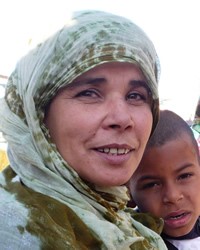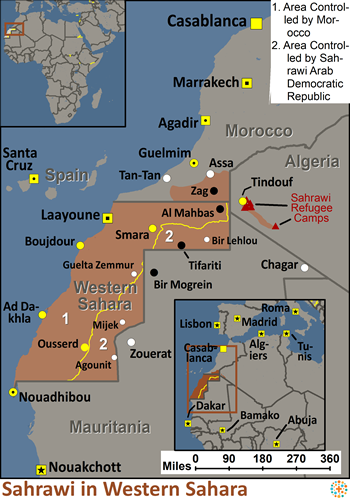A sub-group of the Moors, they are of mixed Berber, Arab, and black African descent. Originally, the Sahrawi were desert nomads who traveled from place to place with their camels. Today, they can be found in the desert in southern Morocco, in the Western Sahara region, in the north of Mauritania, in Algerian refugee camps, and in the Canary Islands. Western Sahara was a Spanish colony, but Spain pulled out in 1976. Then Morocco and Mauritania invaded the former colony. Mauritania pulled out in 1979 but Moroccan troops still occupy the territory. They fight the Polisaro Front, the group fighting for independence for Western Sahara.
Many Sahrawi are now caught in the fighting and have fled to refugee camps in Morocco. Many others have remained in Western Sahara. These people face constant danger from the Moroccan army and the Polisaro guerillas. Women and children have fled to refugee camps and depend on special programs for basic necessities.
Sahrawi society consists of four main groups: warriors; marabouts, or holy people; tribute payers, who pay taxes to the higher classes; and black slaves. Craftsmen and musicians form separate, low-caste groups. In the past, differences in social class were clearly marked. The eight Sahrawi tribes were constantly at odds with one another, struggling for supremacy. Fighting, robbery, and revenge were the means of surviving drought and plagues. Peace through negotiation always followed.
Today, classes serve more as a means of identification rather than a way of life. Some Sahrawi are herdsmen, others are traders, and still others are warriors. However, all speak an Arabic dialect called Hassaniya. In addition, their religion, way of life, and dress are Arabic in flavor and style.
While many pre-Islamic beliefs still exist among the Sahrawi, they like to think of themselves as pure Muslims, though they are not that orthodox. Like most North African groups, they hold to beliefs that certain dead Muslim teachers have a power that can be accessed for healing through pilgrimage to their grave sites. Some scholars have mentioned that the Sahrawi also worship a god known as Sidi Erbbi, who is paternal and full of life.
The Sahrawi live in an area of war and political turmoil. As a result, families have been divided, and many have been displaced in refugee camps. Their desire for political recognition and independence is strong. Fervent intercession must be made if the Sahrawi are to find lasting peace in a saving relationship with Christ.
Pray for peace in the Western Sahara. Ask God for the formation of Bible believing churches among this people group in Western Sahara. Pray that the Sahrawi would come to see Jesus Christ as the Prince of Peace and flee to him for refuge. Pray for Christ's ambassadors to go to these Muslims, bearing the sin-forgiving Savior.
Scripture Prayers for the Sahrawi in Western Sahara.
https://en.wikipedia.org/wiki/Sahrawi_Arab_Democratic_Republic
https://www.bing.com/videos/riverview/relatedvideo?q=Sahrawi&mid=E4788BDCEAA08D8733A5E4788BDCEAA08D8733A5&FORM=VIRE
https://www.bing.com/videos/riverview/relatedvideo?q=Sahrawi&mid=3
| Profile Source: Joshua Project |

























